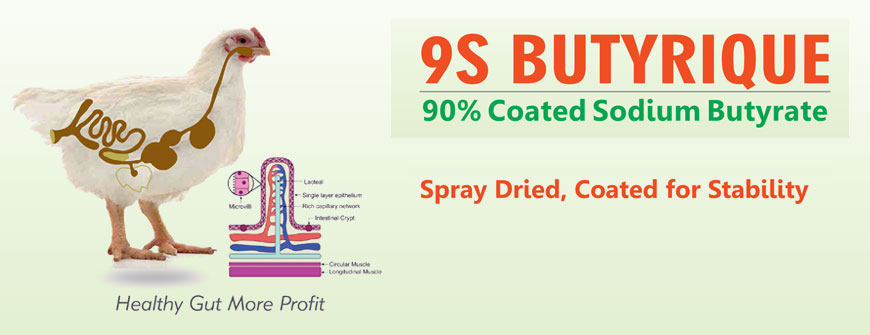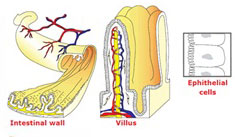| Spray Dried | |
| Coated for Stability |

9S Butyrique is 90% sodium Butyrate produced by spray dried technique with double coating.Designed to have optimal performances in the intestine of Poultry and livestock.
Composition:
90% Double Coated Sodium Butyrate in Pellet / Granular Form
Features

Unique Features :
| Stable and resistant to pelleting and mixing. | |
| No foul odor. | |
| Lower inclusion level. | |
| Maintains pH throughout the intestine. |
Sodium Butyrate Functions:
| It acts as ligand for transmembrane receptors, as a modulator of gene activity, and as a direct energy source for cellular metabolism via B-oxidation. | |
| It induces the production of host defense peptides .These peptides stimulate the development and repair of the intestinal tract through an increase in cell proliferation. | |
| It increases the absorption of glucose from the intestine. | |
| Butyrate also has been shown to stimulate G-protein-coupled receptors, These peptides have a positive effect on the development of the immune system and improve the functioning of the immune system in case of a health challenge. Other peptides have been shown to optimize gut motility, by reducing the rate of feed passage. In poultry, the emptying of the feed out of the gizzard into the small intestine is slowed down. | |
| Stimulation of digestive enzyme production, enhanced development of intestinal villi, reduction of acute inflammatory responses, increased GIT retention time, inhibition of cancer cell growth and the secretion of host defense peptides. Apart from effects in eukaryotic host cells, butyrate is also described to have an impact on the activity of prokaryotes residing in the animal's GIT. For example, it has been shown to affect the colonization of Salmonella and Campylobacter and to influence the composition of the gut microbiota. |
Indications:
| To maintain good gut health. | |
| To Prevent colonisation of E.coli and salmonella in the intestine. | |
| The better development of the intestinal epithelium results in an increased intestinal surface that will be in contact with the feed bolus, ensuring a better digestion. | |
| Improves the energy and protein digestibility of the diet, probably because of a higher intestinal villi length of the animals. | |
| Improves better shell quality in older layers. |
Suggested Usage:
Poultry and Aqua - 250 gms/MT, Plgs - 300 to 600 gms/MT also As Suggested by Nutritionist
Presentation:
25 kg drum
Uttar Pradesh
- Plot No.4&5, B-1 / A, First Floor, Above Axis Bank, Sector - 51, Noida, UP - 201301.
- +91 1202973131
- info@invetisls.com
Africa
- Post box no 2735, Behind Airwing Njewa Lilongwe, Malawi.
- +91 1202973131
- info@invetisls.com
Singapore
- 27, Pioneer Road North #01-01 Singapore 628470
- +91 1202973131
- info@invetisls.com
Namakkal
- 4/249 ,Ravin Plazza, Trichy Main Road, Namakkal - 637 001
- +91 1202973131
- info@invetisls.com
